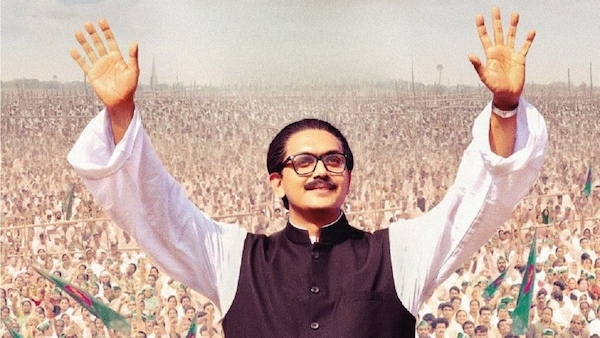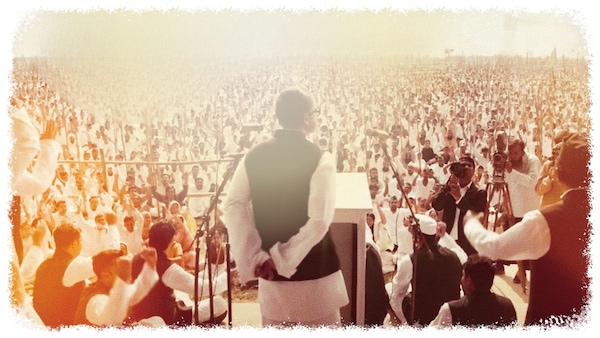Mujib: The Making of a Nation Review | Shyam Benegal Helms An Unnecessary & Trite Biopic
Mujib is a film so bereft of opinion that it could pass off as a government PSA and one wouldn’t know the difference.

Last Updated: 04.01 PM, Oct 27, 2023
SHYAM BENEGAL’s Mujib: The Making of a Nation, a biopic on Bangladesh’s founding father Sheikh Mujibur Rahman, is barely a film. It is an overwrought venture held together with dry artifice. It is a collation of the past with such stagey awkwardness that it is surprising that someone directed it, let alone the fact that the person is Benegal. Mujib is not just the antithesis of what a political film should be like — commentaries are dwarfed to jibes and any form of criticism is obliterated — but it is also evidence of what controlling directives can do to art: it can ruin them.
On paper, the narrative is informed with historical accuracy laced with propaganda. The story opens in 1972, a year after Bangladesh gained liberation and when Mujib, who had relentlessly fought for the autonomy of the nation, came back from exile to become the president of the new country. It then goes back from tracing his childhood to involvement in politics, his marriage and fulfilling domesticity. As the title suggests, the trajectory of his life is paired with the birth of a nation. It is not a tall claim. A cursory glance at the bloody history of Bangladesh will reveal the contribution of someone like Mujib who was instrumental in lending force and vocabulary to the people of Bangladesh, back when they comprised East Pakistan, to fight for the freedom to speak the Bengali language and have a cultural identity as opposed to a religious one.

Benegal’s film addresses all of these — the 1952 Language movement were several students died while protesting against Muhammad Ali Jinnah’s order of recognising only Urdu as the official language of Pakistan, the 1971 Liberation War, India extending support to Bangladesh at that time (there is footage of an Indira Gandhi interview where she is defending India’s stance). But they are inserted with as much tepidness as if we are witnessing a school kit. The craft is almost infantile in the way it refuses to enrich even one frame in the film.
Take for instance the way the voiceover by Mujib’s wife, Sheikh Fazilatunnesa Mujib (Nusrat Imrose Tisha in the outing), is deployed. It is used more as a crutch than a device. In the film, there is one moment when we see a young Mujib (Arifin Shuvoo) going on a hunger strike and being on the verge of death. This is followed by him looking completely healthy like nothing ever was the matter. The only way we know some time has passed is due to the voiceover that tells us so. Similarly, we get one scene referring to the 1947 Partition and in the next it is done. One can argue that the scope of the narrative is vast and this is Benegal compressing the story but in reality, it translates as a shorthand used to impart continuity in scenes that have none.
This is just one of the many inadequacies plaguing Mujib, a film so bereft of opinion that it could pass off as a government PSA and one wouldn’t know the difference. This is a pity on multiple levels. For one, the history of Bangladesh’s struggle is fascinating, rich with social context. The country went through two sets of displacement (in 1947 when Bengal was divided to form a part of Pakistan and later in 1971, when the fragment became Bangladesh) and its identity politics is complex — where language plays a more pivotal role than religion. Benegal had everything at his disposal and yet the film he has made feels childish for its lack of ambition, which is only made worse by terrible VFX.
Secondly, it is difficult to justify the presence of something like Mujib in the current scenario because films in Bangladesh have never been better. In the last couple of years the country has undergone a cultural resurgence of sorts where many young, diverse voices have surfaced on the scene who are actively changing the face of Bangladesh cinema. The Liberation War and Mujib’s role in it feature as a persisting theme in several of their works. And the inventiveness with which they deal with the subject only makes Benegal’s work look unnecessary in comparison.
The propagandist undertone of Benegal’s film, and the propensity to reduce Pakistanis to caricatures, are both easy to discern and overlook. It is after all jointly produced by the governments of India and Bangladesh (the current Prime Minister of Bangladesh is Mujib’s oldest daughter Sheikh Hasina). Thus, Mujib’s tenure as a president, which had its share of problems with the 1974 famine being the most pressing one, is reduced to deeds by his opposition. But the craft of Mujib is so bad, the performances so excessive and clumsy, that the jingoism becomes a lesser problem. After three hours of staring at static VFX clouds, I had to look at the sky to remind myself of what they actually look like.

 Premium
Premium